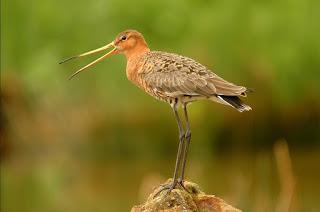
Adult Black-tailed Godwit - David Morris (RSPB)
Two of the first ever British wading birds to be released into the wild under a new conservation technique have been spotted alive and well – 1,200 miles away in Portugal.The two black-tailed godwits from Norfolk were among 26 that conservationists hatched and reared by hand before releasing into the wild, a process known as ‘headstarting’.After release the birds joined wild flocks and this is the first time any of them have been outside the UK.Dutch ornithologists reported seeing the birds among a flock on the Tagus Estuary near Lisbon.The team from RSPB and WWT behind “Project Godwit” has welcomed the news that their protégés have migrated safely.Project Godwit manager Hannah Ward said:“Bird migration is an amazing feat and it’s fraught with dangers. These two godwits were last seen on opposite sides of the UK, one in Essex and the other in Somerset. It’s a huge relief to hear they have both made it to the same spot in Portugal safe and sound. “They’re still less than a year old, so they probably won’t attempt return to the UK to breed this year, but older godwits should be setting off right now. We’re appealing to all birdwatchers to keep their eyes out for marked birds. “Project Godwit birds have coloured leg rings so that we can identify individual birds. Every bit of news helps us create a brighter future for the UK black-tailed godwits.”The whole “headstarting” process involves taking eggs from nests to hatch and rear in safety until they are able to fly and fend for themselves. It is used to bolster wildlife populations that are dangerously low, such as the UK breeding population of black tailed godwits which is down to just 50 pairs.It has been used successfully to help spoon-billed sandpipers in the Russian Far East, but Project Godwit is the first time headstarting has been used in the UK.Project Godwit is a partnership between RSPB and WWT with major funding from the EU LIFE Nature Programme, The HSBC 50th Anniversary Fund, Natural England and the Heritage Lottery Fund through the Back from the Brink programme. The project aims to secure the future of black-tailed godwits in the UK.Alongside headstarting, the project team is carrying out research into the dangers facing the godwits, as well as enhancing and creating habitat near the Ouse and Nene Washes so that when these birds return they’ll find the right conditions to make a home and raise young. The Project Godwit team is also working with communities in the Fens to help them discover more about the godwits, which have historically shared their nearby wetlands.www.projectgodwit.org.uk has more information and links to the project’s social media accounts.
